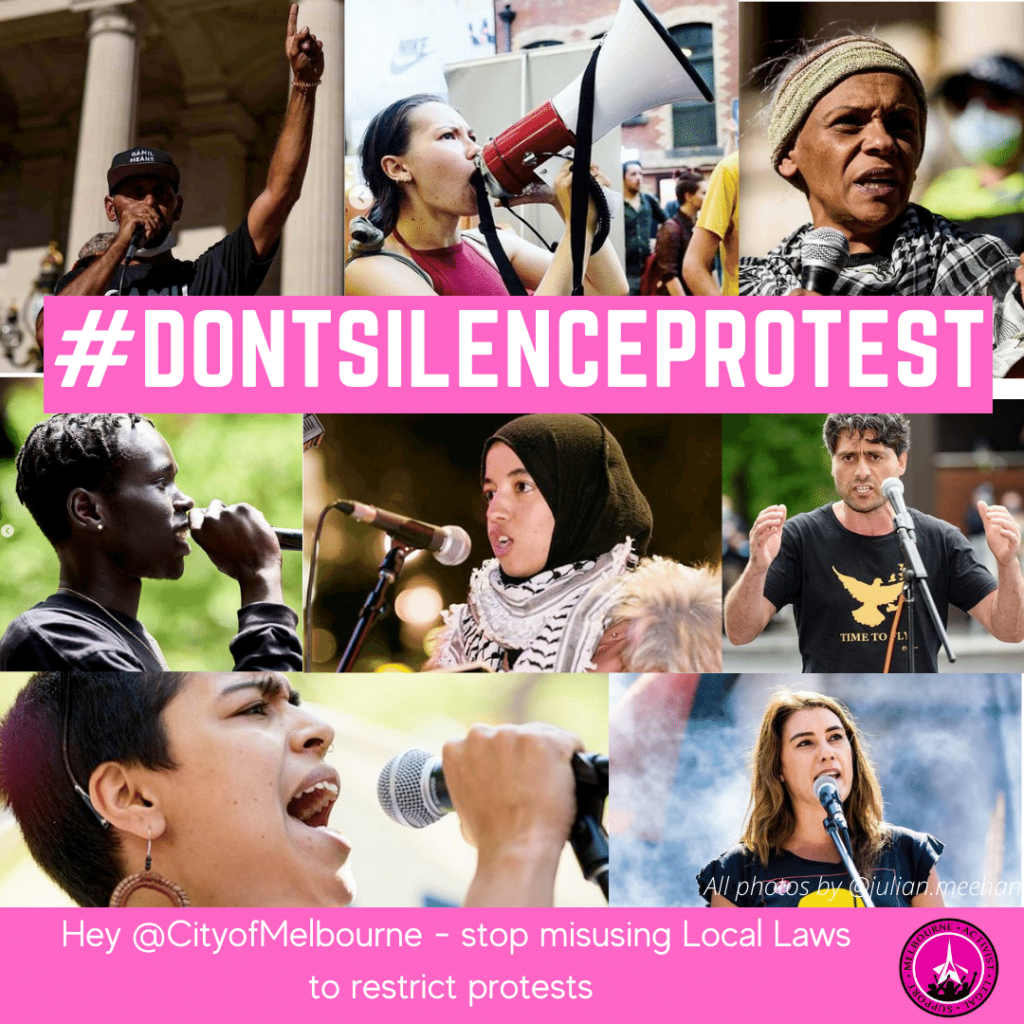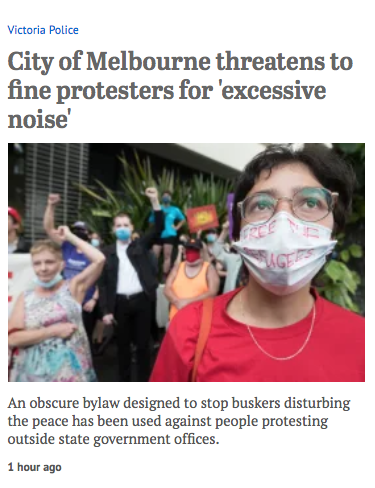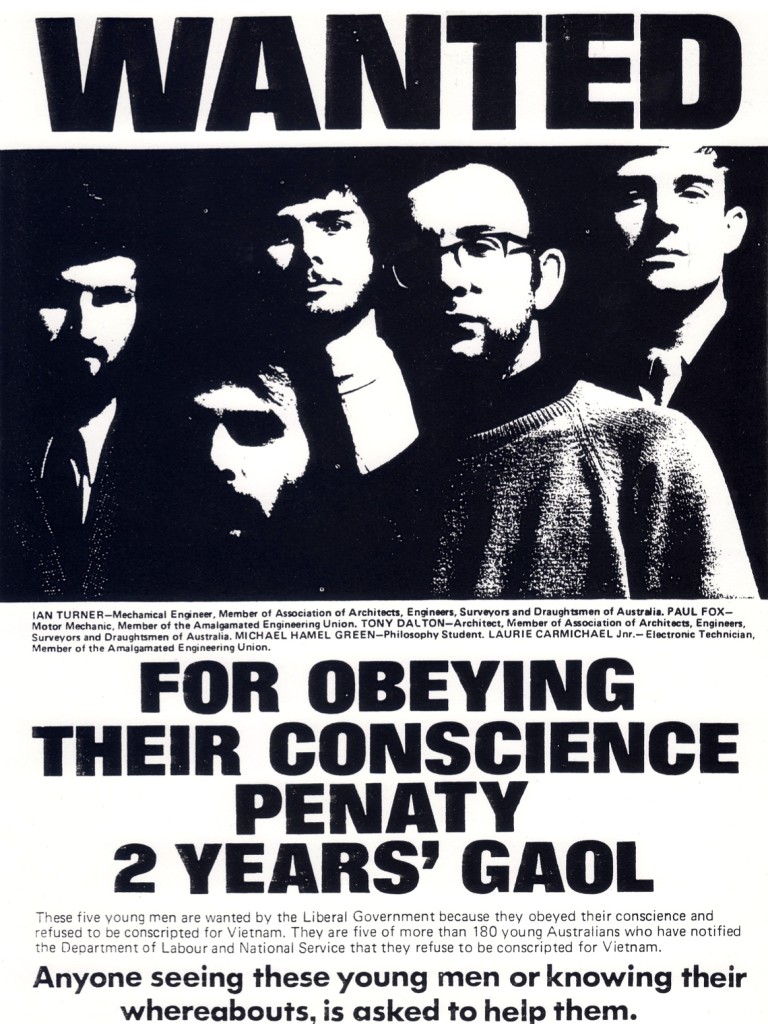Call on the City of Melbourne to stop silencing protests
UPDATE: 12 March 2021
Dear supporters,
Thanks very much for sending a letter back in January calling on the City of Melbourne to not silence protests. You should have received a reply from the council’s Chief Executive Officer stating that the council will “maintain our approach to balancing people’s right to protest with protecting public amenity, without recourse to issuing infringements.”
The City of Melbourne decided not to proceed with fines that two activists were threatened with in January and has indicated that it will not be applying Local Laws in similar circumstances again.
Two City of Melbourne Councillors Rohan Leppart and Olvia Ball issued a public statement on the 25 January which said in part: “City of Melbourne local law officers are employees of the City of Melbourne, and are not – and must never be or be seen to be – an instrument of Victoria Police. The local law was applied in an overzealous fashion at Treasury Place on 13 January: this anomaly was not the product of a changed policy approach to protest by the City of Melbourne.
These events are an important reminder to everyone, especially those in Government, of the primacy of human rights. Whether in deciding how to process asylum applications, or in deciding how to apply local laws, everyone has human rights, whatever your citizenship, background or ethnicity, and all Australian governments must respect them.”
In the past two months there have been no incidents reported to us about Council officers or police fining or threatening to fine protests groups for using megaphones or PA systems.
This small but important campaign is considered a success for now and MALS will be keeping a careful watch and monitoring reports of any use of Council fines or threats of fines at protests events in the future.
If you hear of any use of council local laws against protest activities please report it to us at [email protected]
Thanks very much again for your support.
Protests are being silenced by a misuse of council bylaws.
Not all protests in the City of Melbourne are subject to Council officers issuing ‘Notices to Comply’. Many protests go ahead with small and large speaker systems and megaphones without any issue.
But sometimes, Victoria Police will call up the City of Melbourne council and request Council staff to come down and issue ‘Compliance notices’ to protest organisors or to people in charge of speakers, or sometime to the people speaking at the protest. They will do this when it suits them, when police decide that a protest needs to be deterred, stopped, restricted, or prevented from getting any larger. They will do it in order to provide them with the ‘lawful’ justification to move in and confiscate a speaker, or demand a protest shut down or threaten to use force , or even arrest people for refusing to comply with the Council Notice.
The City of Melbourne itself does not seem to mind protests being a bit loud and Council staff don’t turn up by themselves and monitor each and every protest for “sound levels”. They only turn up at the behest of police.

Extinction Rebellion’s Spring protest events in September 2019 were subjected to the City of Melbourne Local Laws, megaphones and small speakers were seized, speakers threatened. Last week on the 13th January two women organisors of a small refugee protest at Treasury Place received ‘notices to comply’ and threatened with $500 fines after speaking on a small speaker system. Only this last Saturday 16th, at a related refugee protest event in Carlton, the police used quite unnecessary levels of force, even causing injuries, when they acted on the pretext of enforcing these same City of Melbourne local laws to shut down a small speaker system.
Victoria Police members have also threatened people using hand-held megaphones at a related protest outside the Park Hotel in Swanston St, Carlton with these same local laws. Megaphones and portable speakers are fundamental to amplify the many diverse and unheard voices in our society. They are critical to protesting in a modern city.
This tactic of misusing Local Laws as a tool to restrict particular protest event is deeply problematic.

The Activities Local Law 2019 aims to “protect the amenity of public places” regulating things like dogs, motorized toys, busking and advertising signage and other activities. It is not designed or written to control or regulate protest events or to assist police in doing so. Section 5.7 is written specifically to regulate busking.
It usurps and undermines our human rights to freedom of expression (s 15) and peaceful assembly and association (s 16) in the Victorian Charter of Human Rights and Responsibilities Act 2006. On one level it is ‘lawful’ – police can and do help the City of Melbourne enforce its bylaws – but the selective and targeted use of these Local Laws means Victoria Police are contriving to ‘get around’ our rights in the Charter. This is a serious issue.
You can send a letter to the Lord Mayor of Melbourne with a simple request that the Council put in place clear protocols that prevent its local laws being used to silence protest.
Help us call upon the City of Melbourne to stand up for human rights and refuse police requests to silence protests.
SEND A LETTER HERE
For background and a more detailed analysis see our Statement of Concern here.
“It’s very important for people like ourselves to stand our ground and the right to protest is an important right,” she said. “And when we give up some ground, what we actually doing is giving up power.” – Apsara Sabaratnam, who was issued a notice on the 13th January 2021
Some Melbourne History: Resisting By-law 418: the anti-Vietnam War movement in Victoria
In 1969, Melbourne saw a successful campaign to defeat another City of Melbourne by-law (By Law-418) that was being used by police against the movement against the Vietnam War. In January 1969 several students were arrested for distributing ‘Don’t register’ leaflets in the Melbourne CBD. Most were arrested under a Melbourne City Council by-law (By-Law 418) which prohibited leaflet distribution without a permit. By-Law 418 was seen as an anti-democratic denial of freedom of speech and became an early test of civil disobedience tactics in opposition to conscription and the war.This campaign of civil disobedience is not well known but is very relevant to what is is happening today in 2021. This account below is written by Glen Davis.
“The Melbourne City Council (MCC) by-law 418 was revived to limit anti-Vietnam War and anti-conscription activists from publicly stating their case on the streets of Melbourne. From late 1968, individuals and members of a number of groups opposed to conscription for overseas service and to the war had been handing out leaflets in front of the Melbourne Post Office, an action that led to increased conflict with the state.[1]

Anti-conscription poster, c. 1969 (Living Peace Museum)
These actions breached a number of laws, in particular the Crimes Act, as well as the MCC by-law. The MCC decided to initiate prosecutions using the by-law, which had been on the statute books for nigh on a century and was designed to stop the distribution of leaflets not authorised by the Council. The by-law had long been dormant.
The revived by-law appears to have surfaced on 17 July 1968, when two members of Save Our Sons (SOS), Jean McLean and Jo Maclaine Cross, were charged as they handed out leaflets urging non-compliance with the National Service Act. This was during a protest outside Victoria Barracks aimed at blocking a new intake of recruits.[2]
Legal proceedings were begun against McLean, who was represented by Peter Redlich QC. Redlich argued McLean had a right of freedom of expression and opinion under Article 19 of the United Nations Convention on Human Rights. The case was eventually dismissed on a technicality, but gave a warning of things to come in terms of how the MCC would act.[3]
For some participants in demonstrations affected by by-law 418, the arrests of people handing out anti-Vietnam war and anti-conscription material drew links with political persecution in Vietnam. A ‘Don’t Register’ campaign was designed to coincide with the January-February conscription registration period.
The MCC’s use of the by-law provided a spur for a civil disobedience campaign around civil rights issues. Such was the support generated after the initial arrests that over 500 people gathered on the steps of the Melbourne Post Office on the first Saturday in 1969 to engage in civil disobedience by handing out ‘Don’t Register’ pamphlets.
A combination of by-law 418 and the Crimes Act saw over 100 arrests by early March 1969. To highlight the injustice, a prominent trade union official, Laurie Carmichael, brought along a tape recorder to tape police and council statements to protesters being arrested or warned. Carmichael made it clear there would be continuing trade union support for students in anti-Vietnam War and anti-conscription activities. Many of those arrested under the by-law chose to go jail to expose the unjust law and put further pressure on the council to repeal it. On weekends, people rallied outside the Post Office handing out pamphlets in defiance of the by-law.
Further demonstrations took place during March 1969. Students from Melbourne University, Monash University and the Royal Melbourne Institute of Technology organised a demonstration of over 1000 students and workers on 25 March, with assistance from the Rebel Unions.[4] Students for a Democratic Society members and supporters sought to have a delegation meet with the Acting Town Clerk, M. Herd, on 31 March; this failed to influence the MCC to repeal the by-law.[5]
SDS then, with the support of the Rebel Unions, sought to threaten the mayor’s commercial interests. The Chairperson of the MCC General Purposes Committee, which had the authority to repeal the bill, was Sir Maurice Nathan. He had initially made it clear he was not worried about who or how many were arrested, but he would not repeal the by-law.
Nathan was one of the Conservative Civic Group councillors who represented the interests of local big business, also being a director of Courage Brewery. The Rebel Unions took steps to put pressure on the MCC. This included banning transportation of Courage beer. Leaflets calling for a boycott of Courage products were circulated. Courage allegedly began suffering losses and some activists believed this led to the owners of the brewery contacting Nathan to seek a resolution to the problem.
On 9 April, an MCC General Purposes committee meeting saw the Council vote to repeal the bill. By-law 418 was now null and void.
Over the next few years those opposed to the undeclared war in Vietnam, and the conscription of young men to fight and die in Australian uniforms, continued their struggle. They encountered further obstacles, but by-law 418 was no longer one of them.
This is an extract from an article by Glen Davis and drawn from his Master’s thesis, ‘The relationship between the established and New Left groupings in the Anti-Vietnam War movement in Victoria 1966-1972’ (MA, Victoria University, 2001). For more on the by-law 418 story and related resistance see this article by Harry van Moorst.
Help us call upon the current City of Melbourne to stand up for human rights. SEND A LETTER HERE.